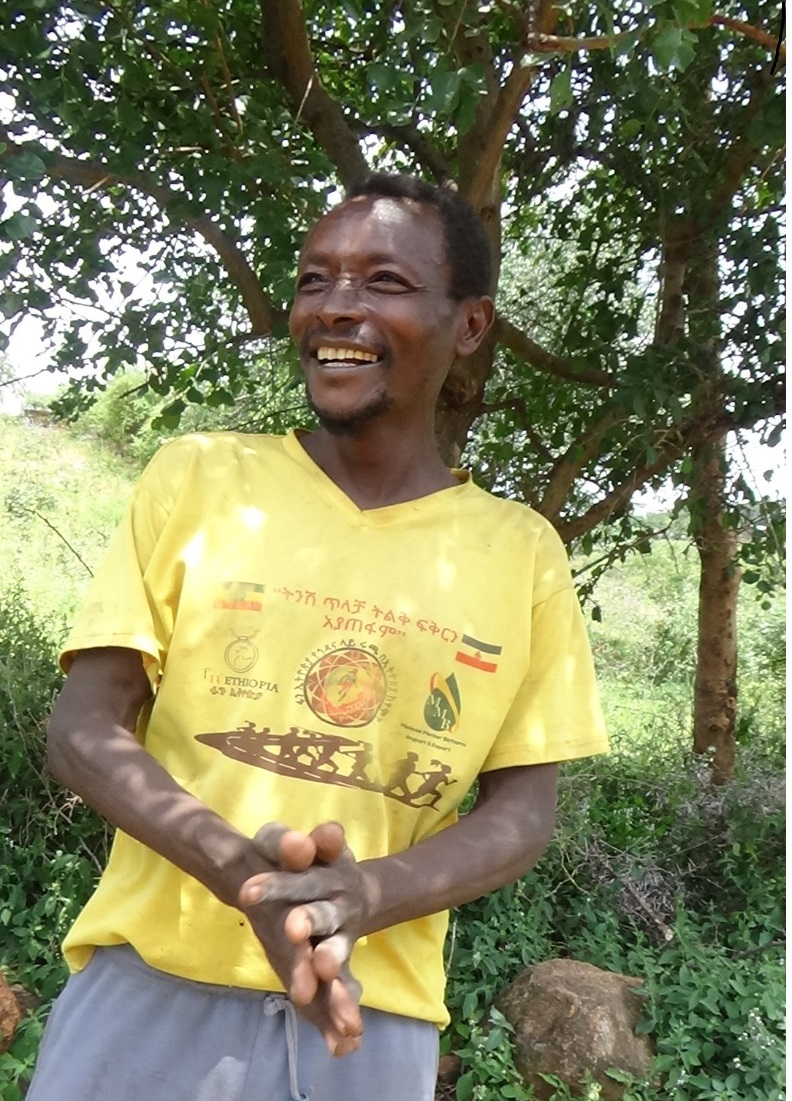
©SCORE Mr. Koyira Zara from Fetele Kebele of Mirab Abaya district
“…I have now hope to be food self-sufficient and graduate from productive safety net food aid…”
The smallholder farmers in Mirab Abays who depend on subsistence farming have little opportunities to diversify their livelihood options. The life of most smallholder farmers relies mainly on agriculture and/or cattle breeding and are dependent on rain. However, the erratic rain in Mirab Abaya negatively impacted the food and nutrition security of households. Recurrent drought is more frequent in the area and households have been experienced drought every other year where farmers lose crops and livestock,
Low agricultural productivity, limited opportunities to diversify income, limited access to agricultural inputs and technologies, dependency on rain-fed agriculture, small landholdings and landlessness, unequal gender relations, etc are found the major factors that contribute to household food insecurity and root causes of poverty in the Mirab Abaya district.
Most of the households are therefore chronically food insecure and as a result, they are under food aid through the government Productive Safety Net Program (PSNP).
To contribute to the long-term food security of vulnerable households SCORE has been implementing the IFSRC project since January /2019. IFSRC has an integrated project that aims to improve agricultural cultivation measures, the creation of alternative income opportunities, and rehabilitation of soil and optimization of potable waters.
The IFSRC has brought new hope for climate venerable households.
Mr. Koyira Zara who is about 37 years old living with 7 family members in Fetele Kebele of Mirab Abaya district enthusiastically explained how IFSRC impacted his livelihood. He started his speech saying: “when I think about IFSRC I feel myself as a tree that planted near the river”
“…IFSRC gave me happiness. I was a farmer who have been struggling with life feeding my seven family members. Our land was not productive at least to cover household food consumption and as a result, I used to collect and sell firewood and earn a small amount of money. We were food insecure and had a food gap for over 4 months and more during drought times. The project has improved my knowledge and skills on how to improve my livelihoods. I have received training and different inputs crop seed, vegetable seed, and fruit seedlings. I have also received poultry. I have managed all as per the training received and become productive. I used to get 3 to 4 quintals from my 0.5 hectares of land but now the productivity is improved and earning around 9 quintals from the same land…”
The IFSRC brought a significant impact on improving households’ productive capacity. The project approach has built on raising community awareness, improving knowledge, and enhancing skills on improved agricultural practices which contributed to significant changes in household productivity.
The project has an integrated approach that contributed to the diversification of household livelihoods options. The project supplied drought resistance, high yield and short maturing seed (maize, haricot bean, round potatoes Tuber, sweet potatoes cuttings, cassava cuttings, and vegetable seed), livestock farming (poultry, dairy, sheep, and goat), and fruit seedlings. The story of Mr. Koyira witnessed that the project’s diversified and integrated support has contributed to household food sufficiency.
“…beyond the crop production I have planted vegetables and fruit trees, I have also poultry production and benefiting from the egg and vegetable for household consumption. I have also sold some of the eggs and chicken leftover from household consumption and able to buy additional 12 poultry. After feeding them for a while I have sold out and bought goat each ETB 1500 and invest the rest of the money for other activities. Finally, I have sold the goat after feeding for some months and bought ox by ETB 5000 for fattening. I have a plan to sell the ox by ETB 20,000 and I am properly feeding the ox for fattening…”
The IFSRC has realized household income increased as a result of productivity increased and household livelihood diversified. Most of the project targets able to produced crops beyond household food consumption and marketed their products for additional income to the households. Householders are therefore able to improve their food security and living condition. Consistent with this the story of Mr, Koyira witnessed the project increased household income and living conditions.
“…I have sold some of the crops produced and livestock and were able to change our hats with a corrugated iron sheet and bought farm tools. My family living is changing we have vegetable, poultry, crops, potato, etc to mix in our diet. The education we received on dietary practices improved our knowledge and practices so we are better feeding our families. We become food self-sufficient and have hope to graduate from the food aid program.
The IFSRC project came to improve most of our critical problems. Our problem of drinking water is improved we have water access which is essential for our living, vegetable gardening, etc. The water has also reduced our workload. The community used to travel around 1km for fetching water but now this is changed. My wife gave birth last week and so the water is very near to us and I am fetching to support her…”
The project giving due emphasis to community awareness, knowledge, and skills on improved agricultural practices and diversifying livelihood options through an integrated approach contributed to household food self-sufficiency which is one of the best practices of the IFSRC project.
